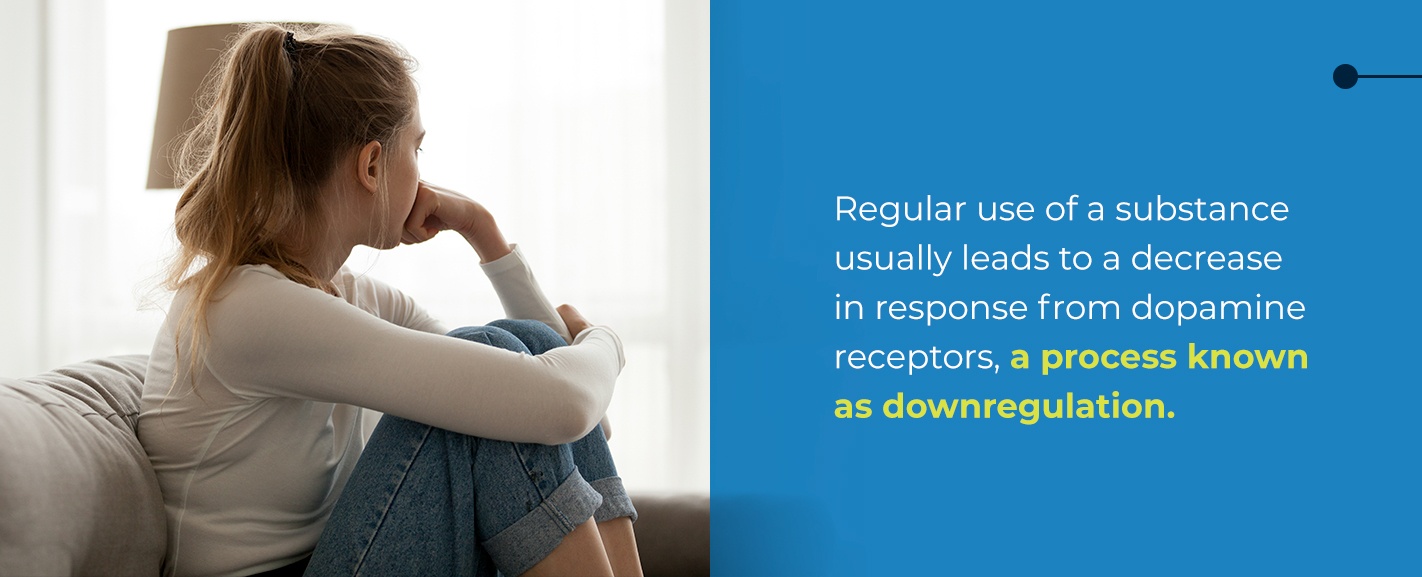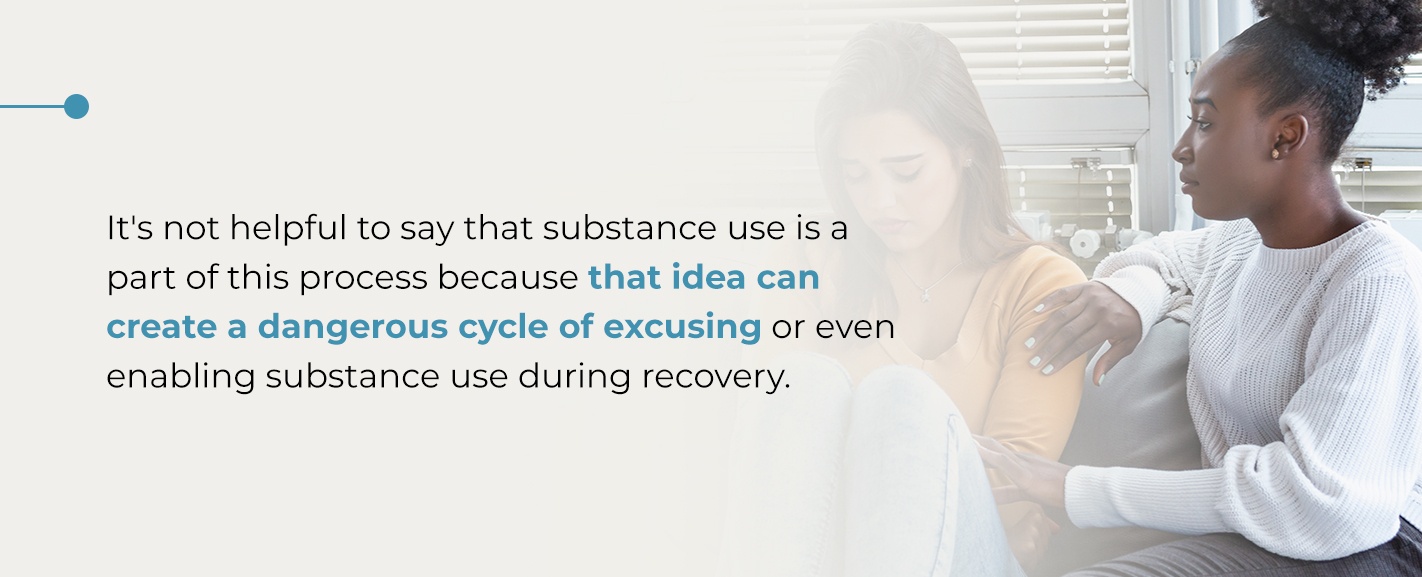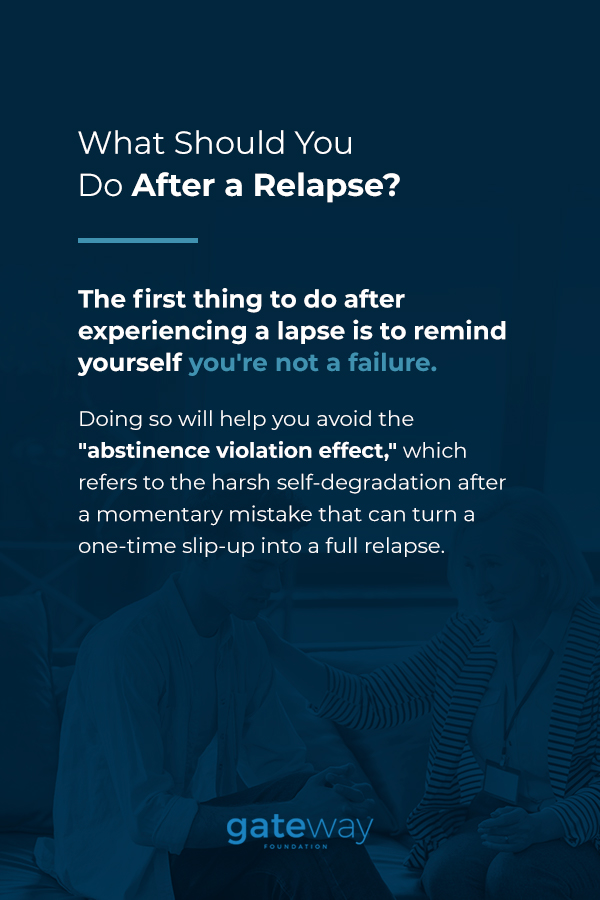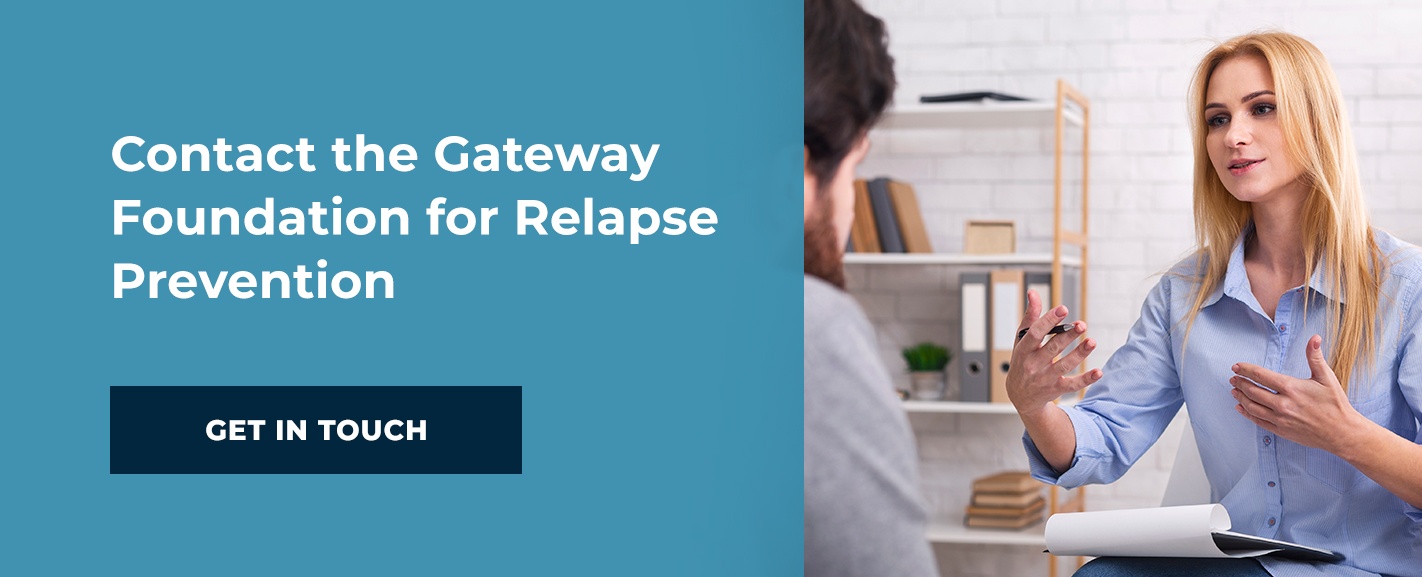- Oct 9
- Drug Addiction Treatment
Anyone who has firsthand experience with addiction — either from going through it themselves or seeing a loved one suffer with it — knows that recovery is almost never a straight path from rehab to treatment completion to full-time sobriety. The realities of addiction recovery are far more complicated and require sensitivity to the possibility of relapse.
However, claiming that relapse is a natural part of the recovery process suggests recovery and relapse go hand in hand, which is not true. Excusing regular relapses can do much more harm than good. So how do you deal with relapse during recovery?
If you or a loved one is wondering what to do after a relapse, this article will outline how to overcome a past mistake and move forward with recovery. We’ll give a clearer definition of what relapse is, why it happens so frequently, what it means and what to do when you relapse.
- What Is a Relapse in Recovery From Addiction?
- Why Do People Relapse?
- Is Relapse a Normal Part of Recovery?
- Does a Relapse Mean You Have Failed?
- What Should You Do After a Relapse?
- How Can You Learn From a Relapse?
- Contact the Gateway Foundation for Relapse Prevention
What Is a Relapse in Recovery From Addiction?
A relapse occurs when a person begins using a substance again after a period of abstinence from that substance. Although relapse can be extremely discouraging and leave an individual feeling hopeless that they’ll ever be able to stay sober, it’s actually a common struggle for those recovering. With 40% to 60% of those with a substance use disorder who receive treatment relapsing within the first year, some people even refer to relapse as a natural part of recovery.
It’s important to realize relapse is more of a process as opposed to a mere lapse in judgment. While a lapse can be a single event — such as a poor decision of going back to old people, places and things or having a bad day — a relapse occurs when the process of returning to those things is recurring and starts becoming a habit again. Recognizing that a relapse stems from a pattern of behavior and is not just something people fall into is essential to breaking the cycle.
Having a firmer grasp on the definition of relapse gives individuals the chance to redirect their attitude and actions effectively after a lapse. Deciding to learn from a lapse and asking for help rather than falling back into old routines will prevent future incidents and keep individuals on the road to recovery.
Why Do People Relapse?
Relapse is not quite as simple as not having enough willpower. Addiction is physiologically difficult to overcome because, over time, it overwhelms the brain’s control circuit by dulling its sensitivity to rewards like dopamine — all while increasing its expectation for more rewards. Addiction has such a big impact on how the brain works that many organizations dedicated to studying drug use categorize it as a brain disease.
Most addictive substances spur a release of dopamine within the brain’s reward centers, leading to a feeling of significant pleasure. This feeling is known as a “high” because it is more intense than the normal amount of pleasure experienced after natural reward-inducing activities like exercising, eating or receiving a hug. This immense euphoria is what pushes someone with substance use disorder to keep using more and more to get that sensation back.
Although the feeling of a high is strong, it is fleeting. Regular use of a substance usually leads to a decrease in response from dopamine receptors, a process known as downregulation. This process occurs with consistently elevated substance use and results in a lower production of dopamine even in response to healthy, natural rewards.
Because of this diminished amount of dopamine, an individual may seek more of a substance or a more intense form of it in hopes of achieving a high again. Without the substance they’re reliant on, the individual might experience extreme dissatisfaction with life. The dopamine-related changes in a regular substance user’s brain have also been associated with lowered activity levels in the prefrontal cortex, which often leads to an increase in impulsivity.
In addition to these physiological challenges, those recovering must navigate psychological and social changes. During treatment, most are in a protective, substance-free environment focused solely on recovery, which can make transitioning back into their usual environment difficult. This issue is why finding a program that offers continual support and relapse prevention services is crucial.
Once out of treatment, an individual will also have to find ways to avoid old triggers, such as socializing with substance-using friends. They will need to find healthier environments to hang out in that won’t tempt them to use again. They may also need to develop different coping mechanisms for dealing with things like past trauma or mental health struggles that would have made them turn to their chosen substance in the past.
So while a relapse may appear to be some sort of moral failure to an outsider, there is much more to it than meets the eye. Understanding the complexity of addiction makes it easier to see why recovery typically isn’t a constantly progressive process. The chronic nature of substance use disorder makes relapse not only possible but more likely, according to the National Institute on Drug Abuse.
Is Relapse a Normal Part of Recovery?
Although the rate of relapse among those within their first year of recovery is high, it’s not that surprising given the many factors that go into remaining abstinent. A person will likely encounter some setbacks on their journey to sobriety, but it’s necessary to keep the separate definitions of relapse and lapse in mind. Momentary lapses in judgment are normal, but returning to an old lifestyle has no place in true recovery.
Saying “relapse is part of recovery” is actually not logical because it implies that using drugs is a part of not using drugs, which does not make any sense. Often, the phrase is used to comfort someone who has just suffered a small lapse, but it can become a harmful mantra that normalizes returning to former patterns. Although it may seem like a harmless phrase, it gives a false impression of what recovery should look like and provides an excuse for re-adopting prior habits instead of developing new, healthy ones.
True recovery is a complete lifestyle change, not simply giving up substance use. This means recovery involves confronting the things that used to drive someone to use and handling them differently. It’s not helpful to say that substance use is a part of this process because that idea can create a dangerous cycle of excusing or even enabling substance use during recovery.
Ultimately, the goal for everyone in recovery is the same — to achieve lasting sobriety through abstaining from drugs and alcohol. While the path to sobriety varies, and it’s important to recognize everyone has different needs, the most effective way to remain sober for an extended period is to log more time being sober.
Research has shown that only one in three people who have been abstinent for less than a year will stay sober indefinitely. However, after a full year of sobriety, the number of former users who remain consistently sober jumps to 50%. Further, only 15% of people relapse after five yearsof abstinence.
Those recovering from substance use disorder shouldn’t live in fear of relapse statistics like these, but they should heed them as a warning of how easy it can be to relapse. Relapse is a dangerous trap to get caught in, but approaching it with an honest desire to stay sober — plus serious effort to do so — will make sobriety more achievable.
Does a Relapse Mean You Have Failed?
Compare your commitment to recovery to a resolution to go to the gym more often or give up a certain social media platform. Think about how challenging it can be to get up early to work out each day or resist the urge to scroll through friends’ posts. Would skipping a day at the gym or spending a few minutes on a specific app mean you’ve totally failed? Of course not.
Substance use recovery similarly involves significant lifestyle and behavior changes, which usually includes some slip-ups. In the same way that missing a workout doesn’t have long-lasting detrimental effects as you return to your training schedule the next day, lapses in substance use recovery don’t have to be severely damaging either. Just like skipping the gym one day doesn’t make you a failure, neither does a moment of weakness during substance use recovery. Giving up on seeking help and returning to active addiction is what significantly derails recovery.
Considering how common relapse is, it’s critical to address a lapse correctly. Although relapse shouldn’t be touted as part of recovery, encouraging someone to forgive themselves fully and quickly after a small setback is crucial to helping them continue their recovery process. Remember that a relapse involves a return to harmful attitudes and behaviors, so fostering a mindset focused on sobriety is key.
Keep in mind that one minor setback does not negate all the progress made up until that point. Immediately returning to the recovery plan after a momentary mistake can affirm someone’s commitment to sobriety. An individual’s reaction can demonstrate their conviction, perseverance and dedication to change.
What Should You Do After a Relapse?
The first thing to do after experiencing a lapse is to remind yourself you’re not a failure. Doing so will help you avoid the “abstinence violation effect,” which refers to the harsh self-degradation after a momentary mistake that can turn a one-time slip-up into a full relapse. If you’ve had a lapse, be careful not to berate yourself or fill your thoughts with the idea that you don’t deserve recovery and will never attain long-lasting sobriety.
Relapses should be handled with gentleness and understanding while remembering that they are extremely dangerous. For those whose systems have adjusted to being substance-free, a sudden relapse into using high doses of drugs or alcohol again could be life-threatening. Recognize that relapse is common, and don’t let it undermine your recovery progress.
Instead, get back on track by seeking help. For both a lapse and relapse, trying to ignore it or cover it up is the worst response. Opening up to friends and family and asking for help will allow you to confront the lapse or relapse and deal with it, rather than getting stuck in a cycle of using. Once you have the support you need, it will be easier to make lifestyle changes and go back to treatment if necessary.
Whenever someone reaches out for help after having a lapse, they should be encouraged and praised for having the courage to seek assistance and maintain their progress instead of sinking deeper. Making the effort to get help demonstrates a deep desire to recover more fully by understanding what triggered the lapse. Because recovery is a learning process, the mistakes made during a lapse can help people discover what behaviors, emotions or environments they need to be more aware of to keep themselves on the road to recovery.
How Can You Learn From a Relapse?
Recalling that lapse is a single event, there are ways you can learn from it to prevent it from growing into a relapse. You can turn a lapse into a positive event if it’s addressed productively. If a lapse is used as an opportunity to dig into the root issue, learn and grow, it can become a greater investment in an individual’s recovery.
Looking into what led to a lapse or relapse can reveal what behaviors or attitudes still need to change to achieve long-term abstinence. Identifying personal habits and creating new ones is a great way to stay on a steady recovery path. Along with forming new habits, learning more about what triggers an individual to use and how to avoid those things is valuable information in combating addiction.
Here are five lessons often learned through a lapse:
- Moderate substance use can be dangerous, and having a “just one” mindset is toxic.
- Certain people or places can no longer be interacted with or visited if long-term sobriety is going to happen.
- A plan needs to be set in place for how to get out of triggering situations, such as forming a list of people to call for help.
- There may be some underlying mental health issues that still need to be addressed for the sake of sobriety.
- Depending on how severe the lapse was, a return to treatment may be necessary.
Contact the Gateway Foundation for Relapse Prevention
With over 50 years of addiction treatment in the Chicago area, the Gateway Foundation has the experience and therapy methods necessary to help you avoid a relapse. Our locations offer a wide range of care levels and treatment programs designed to ease the transition back to regular life and prevent relapse.
Alumni of Gateway Foundation treatment programs have a lower risk of relapse because we stick with them for life, offering continuous support. Our alumni network provides a community of caring individuals focused on sobriety to help people stay connected with supportive figures after completing treatment.
For more information about relapse prevention or our addiction treatment programs, contact the Gateway Foundation today.






